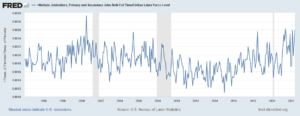August 10, 2022
The major news outlets seem determined to tell everyone how terrible the economy is, even as unemployment is at a 50-year low and workers at the bottom end of the income distribution are seeing wage gains that outstrip inflation. We saw endless stories about how high gas prices were making it impossible for families to make ends meet as gas prices were going up. With gas prices plunging the last month and a half, the media apparently don’t think the price of gas is that important.
In keeping with this “the economy is terrible” theme, the Washington Post had a piece a few weeks back telling us that a record number of people report holding two full-time jobs. As the Post article explained, they need to work two full-time jobs to make ends meet because inflation is so bad. It seems this story has now migrated to Marketplace radio.
There are two problems with this story about workers being forced to work two jobs to make ends meet. The first is that wages for workers at the bottom have actually substantially outpaced inflation over the last few years. According to the Bureau of Labor Statistics, the real hourly wage for production and nonsupervisory workers in the hotel and restaurant industry was more than 5.0 percent higher in July than it was three years ago. However bad things might be for low-paid workers today, it was worse in the recent past.

The other problem is that a large number of people holding two full-time jobs seems to be evidence of a strong economy, not a weak one. While the data are erratic, the all-time peak in this number—measured as a share of the labor force—was in 2000, at the top of the late 1990s boom. The number fell in the years following the Great Recession, before rising again as the labor market strengthened in the years just before the pandemic. Both the Washington Post and Marketplace radio have effectively turned reality on its head to tell their terrible economy story about a statistic that actually suggests a good economy.
To be clear, there are undoubtedly millions of low-paid workers who are really struggling to get by and are often failing. But this is always true. Even in the late 1990s boom there were hundreds of thousands of families who were being evicted every year and millions more going without adequate food and being hounded by bill collectors.
However, the media did not choose to present these people as representative of the state of the economy as they are doing now. For whatever reason, the media have decided the economy is terrible and they are not going to let the data get in the way.







Comments